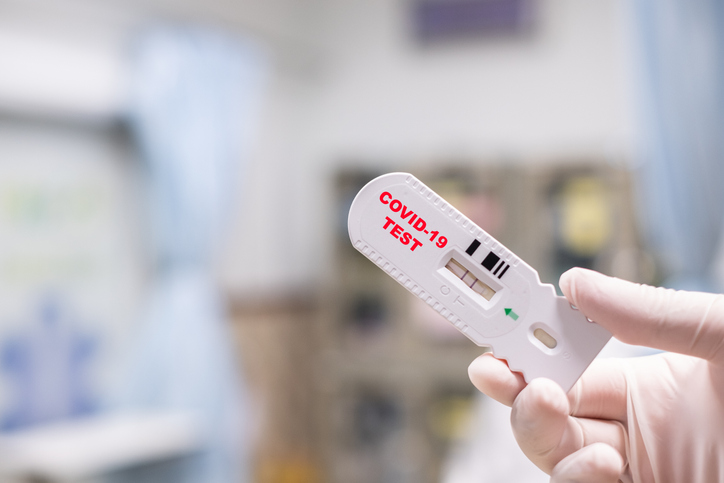The idea of a rapid, frequent and more widespread test for COVID-19 could be more complex in practice, says Roger Klein, M.D., J.D. an expert in molecular diagnostics and regulatory issues and policy advisor to The Heartland Institute, which co-publishes Health Care News. Klein spoke with Health Care News about the hurdles a strip test would have to overcome for it to be a realistic tool in curbing the pandemic. See related article, August 24.
Health Care News: The public is frustrated with how little the lockdowns seem to have controlled the virus. The idea of an inexpensive, easy, and rapid test seems like an obvious solution, but is it?
Klein: The notion that one can reliably separate people into two groups, those who are infectious and those who are not, based upon neatly divisible viral levels, is more complex in practice. If the test performs as we hope and assumptions about viral transmissibility prove correct, we then need to ask what proportion of the population could or would properly test themselves on a daily basis. Participation would likely be far less than needed to control a pandemic. Those at risk for spreading the disease are probably least able or willing to engage in daily self-testing. We then need to assume people will act on the results. Would people with no systems stay home?
Health Care News: Should the U.S. Food and Drug Administration (FDA) do more to maximize the potential of these tests?
Klein: FDA has to ensure the tests are safe for individuals to use. Home tests all have to meet a set of standards. First, tests have to employ methodologies so simple and accurate as to render the likelihood of erroneous results by the user negligible. Second, the Secretary of Health and Human Services has to determinine the tests pose no unreasonable risk of harm to the patient if performed incorrectly. Even under emergency use authorization, FDA will want to ensure tests do not pose risks to individuals. For example, if a test has poor sensitivity, it could mislead people into taking unsafe and risky actions with respect to themselves or others in which they may otherwise not engage, for example, visiting grandma at her nursing home. FDA would need to have standards and base the standards and adherence to them, on data.
Health Care News: Wouldn’t this be a good time for FDA to lower those standards, as we seem to be in a race against time?
Klein: The issue is whether FDA’s standards are too high and whether lowering them provides benefit in some settings. This is undoubtedly true. We use rapid, less sensitive tests for influenza in order to rapidly administer antiviral agents but have only limited access to such tests at this time for SARS-CoV-2. There is nothing preventing use of rapid testing up front, supplemented by more accurate PCR resting, either for patients in who the disease is suspected or who are at high risk for it, or in conjunction with rapid testing on a sampling basis in a surveillance program.
I think rapid testing, even with lower sensitivity, has definite and important uses in certain settings. Those would include workplaces and nursing homes, as part of surveillance programs intended to curtail local outbreaks. FDA needs to be aware of and open about other uses and avoid rigidity as it balances benefits vs. harms. There has to be a cultural open-mindedness and diminution of the FDA’s characteristic risk aversion in meeting the exigencies of the epidemic
Health Care News: For rapid tests to make a serious dent in spread, there would have to be widespread compliance. Could that happen in the United States—compulsory testing?
Klein: Such a requirement appears impractical based on prior experience and common sense.
We could not in my view legally require this type of program without strong data to support it – which we don’t have, it could not be enforced, and people would not adhere to it.
Health Care News: Let’s say there could be widespread, voluntary compliance. Could it get COVID-19 to a point where we wouldn’t have to worry about it anymore than the flu and could it happen in a reasonable period of time?
Klein: This is unlikely. The epidemic is unlikely to burn out unless and until enough people have some level of immunity gained through infection or a vaccine. Right now, we are in a race between viral infections and vaccine development, the latter of which, if successful, will save lives and avoid substantial morbidity.
For most people, SARS-CoV-2 presents a very small risk and the virus already is in the vein of a “bad flu”—a novel strain that we haven’t seen before—that will not cause serious illness for most infected people. The virus’s pernicious effects are primarily from the large numbers it has [infected] and will infect, and the vulnerability of particular populations such as the sick elderly. Unfortunately, some people are going to get seriously ill and even die from this virus— as they do from other diseases—and we cannot know with certainty who those individuals will be. We can, however, play the odds in order to save as many lives as possible. This means devoting our resources and efforts toward protecting vulnerable populations, such as nursing home residents and other sick elderly people, who are most likely to be harmed by the infection.
Health Care News: Given that we have little history with the SARS CoV-2, aren’t we better off trying anything?
Klein: We would still be prolonging the inevitable. It is preferable to develop immunity through a vaccine, and the Trump Administration’s “Operation Warp Speed” has been a brilliant and, thus far, unbelievably successful attempt to save thousands of lives at a miniscule cost relative to other expenditures during this epidemic. In my view, President Trump and his administration have done an outstanding job in a difficult situation over which we unfortunately, and people don’t want to believe this, have limited control.
